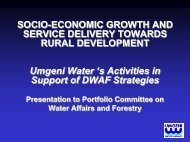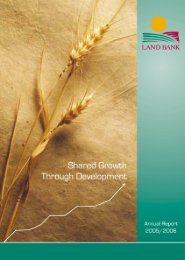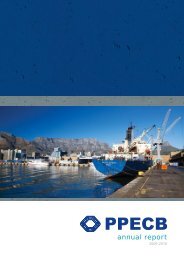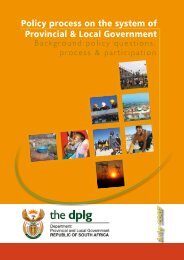Human Settlements Review - Parliamentary Monitoring Group
Human Settlements Review - Parliamentary Monitoring Group
Human Settlements Review - Parliamentary Monitoring Group
Create successful ePaper yourself
Turn your PDF publications into a flip-book with our unique Google optimized e-Paper software.
<strong>Human</strong> <strong>Settlements</strong> <strong>Review</strong>, Volume 1, Number 1, 2010<br />
Understanding the history of racism in the<br />
conservation movement will be important, not<br />
to assign blame, but to diagnose our unhealthy<br />
relationship with each other and with nature,<br />
learn from our mistakes, and begin cooperating<br />
in the ways that we must in order to reverse<br />
our destruction of the Earth’s ecosystems.<br />
Beyond the mechanical<br />
were relatively local, close in time and space<br />
and to where we lived. Today many of the<br />
negative social and environmental side effects<br />
manifest on the other side of the world. Cause<br />
and effect are no longer close in time and<br />
space and not immediately tangible. The case<br />
for sustainability remains frustratingly elusive,<br />
partly because many of the suggested benefits<br />
are intangible (for example “the future”).<br />
An indication of how hard the cultural shift<br />
required would be, becomes clear when<br />
one examines the mechanistic mindset that<br />
pervades our society and our institutions. Our<br />
institutions are governed by habit – notably<br />
by industrial, “machine age” concepts such<br />
as control, predictability, standardization<br />
and “faster is better”. The industrial age<br />
management model breaks the system into<br />
pieces, creates specialists, lets everybody do<br />
his or her piece, and assumes that someone<br />
else makes sure the whole works.<br />
We have difficulty in seeing whole systems<br />
in a culture shaped so thoroughly by finance,<br />
capital and narrow specialisation. How does<br />
one build partnership among all the different<br />
specialists and experts and a sense of<br />
collective responsibility This way of thinking<br />
is still unfamiliar, an effort rather than a habit<br />
of mind. When only the superficial symptoms<br />
of complex problems are addressed, the<br />
underlying problem typically remains unsolved,<br />
and even can be exacerbated if the solution<br />
feeds into a cycle. An integrative awareness<br />
whereby one unites technology, ecology,<br />
society, matter, mind and spirituality has been<br />
lacking in the twentieth century.<br />
Historically our problems, however severe,<br />
Seeing things in their wholeness is socially<br />
threatening. To understand that our manner<br />
of living, so comfortable for some, is linked to<br />
climate change, to cancer rates, to poverty, to<br />
the disappearance of biodiversity, to hazardous<br />
landfills and toxic wastes, to the depletion of<br />
the ozone layer, is the need to for a change in<br />
our way of life.<br />
Inhabiting different worlds – the<br />
faith in a single natural world<br />
comprehensible through science<br />
It is a time of increasingly dire news and<br />
seemingly unsolvable social and economic<br />
problems. The scientific evidence suggests<br />
that the years ahead will test our present and<br />
coming generations in extraordinary ways. We<br />
are all frustrated by our limited understanding<br />
of the challenges. While some see it as a set<br />
of technical problems there is a danger that<br />
superficial approaches give a false sense of<br />
progress.<br />
While cities of the “north” debate their quality<br />
of life, many cities of the south struggle for<br />
life itself. While some people are already<br />
dying due to climate change the experience<br />
132



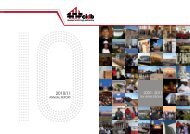
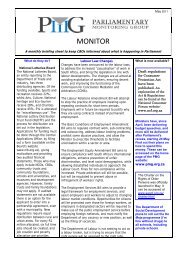
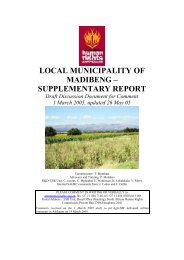
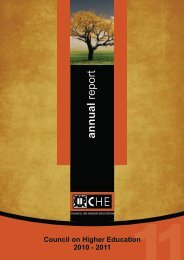
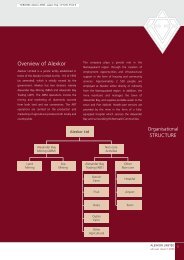
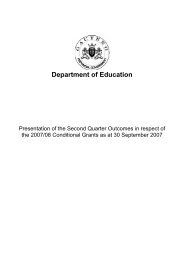
![National Research Foundation Annual Report 2008 / 2009 [Part 2]](https://img.yumpu.com/49774036/1/177x260/national-research-foundation-annual-report-2008-2009-part-2.jpg?quality=85)
